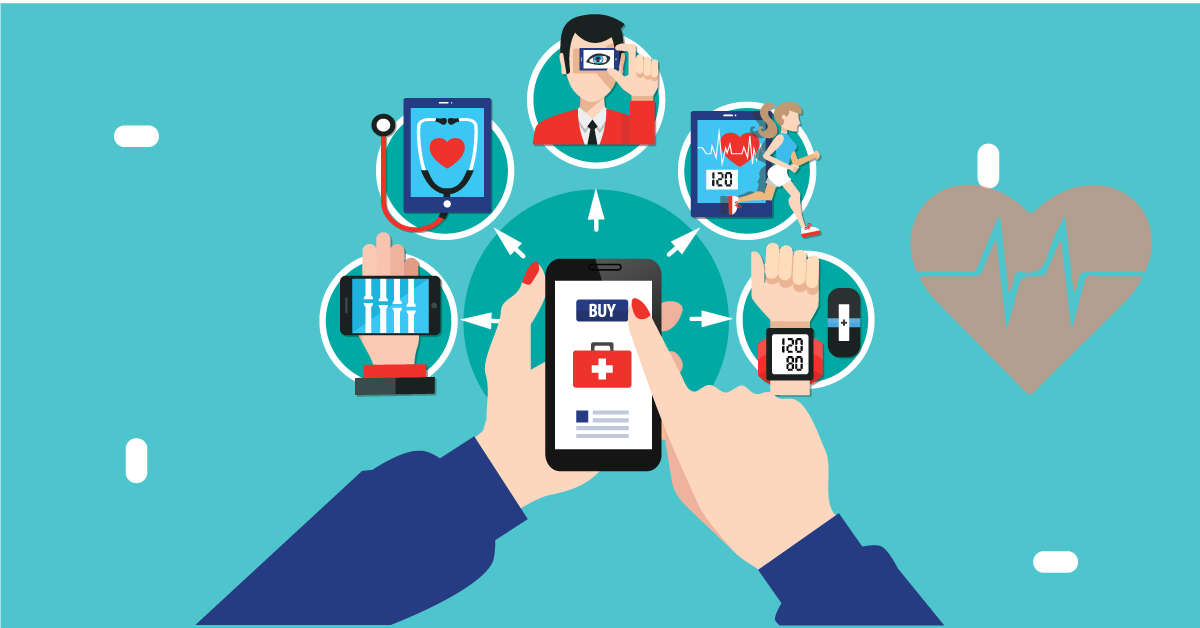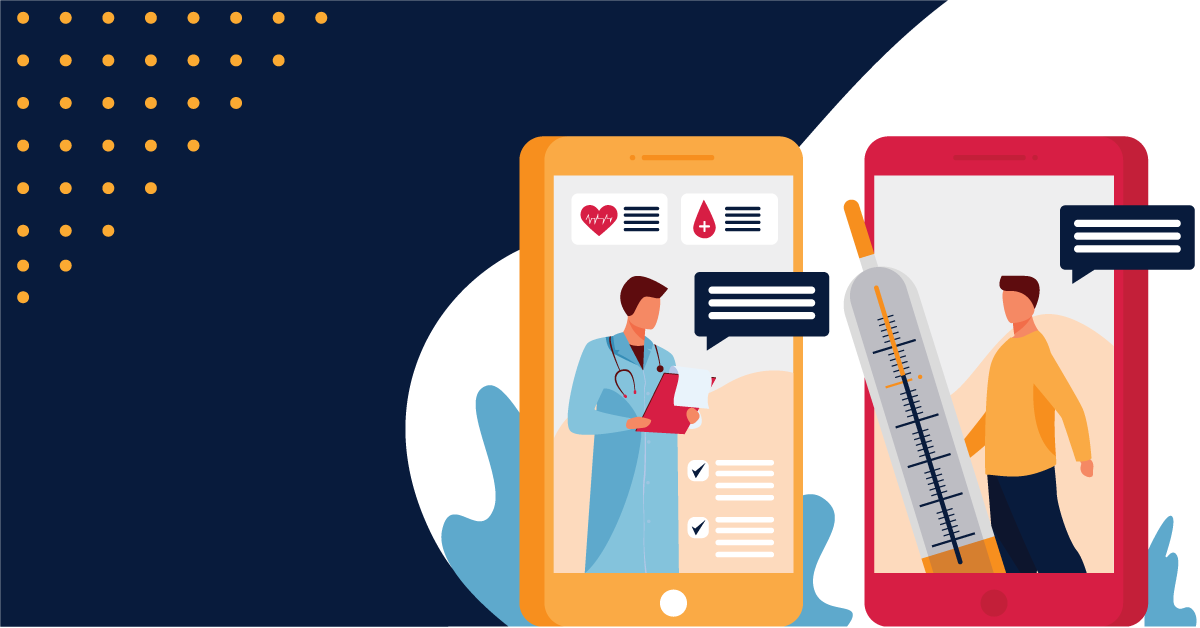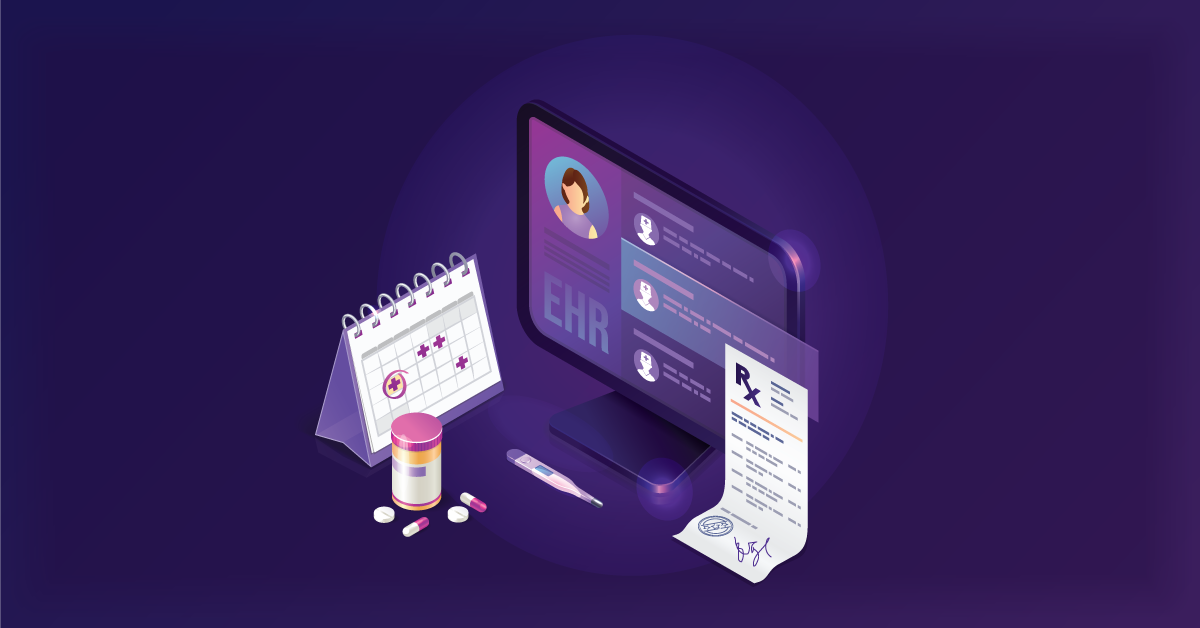Healthcare Apps | Features and Trends

The healthcare industry went through a very turbulent period in the pandemic, and digital healthcare not only became prevalent but prospered.
People googled everything. Starting from what is coronavirus to ways to remain fit. But continuing health checkups amid the pandemic was not easy. So, doctors began seeing their patents online.
To provide access and fulfill the demand, healthcare apps popped in. Through the apps, doctors could easily recommend drugs and prescriptions. Whereas patients could continue their treatment safely. In addition, hospitals and clinics could better manage their patients.
Since the early usage of healthcare apps, the service demands have quite changed. People want more sophisticated and highly functional apps. So in this blog, we see the features to build such healthcare apps and the trends in the industry.
What Are The Features Of Healthcare Apps?

Features of healthcare apps vary with their operational domain. Is it a medicine delivery app, a telemedicine app, a doctor appointment booking, or a dieting app?
Some apps offer more than one service or multiple services, Johnny on the spot. This allows patients or users to access varied services without shuffling between apps. So, those healthcare apps contain several basic and advanced features to make it possible. Here are some of those features in a healthcare app.
Social Login/ Sign Up
Users onboard your healthcare app through signups. Users can opt-out of the app if the signup is too long and complex or has too many fields, resulting in less usage.
Users should be able to sign up with ease. Consider the information you want from them and don't include too many fields. You may include fields on personal information such as user name, email address, or phone number. It is easier for users to log in with fewer fields and details. However, you can always collect more user information when they avail certain services in later usage.
Profiles Creation
A healthcare app should feature profile creation for doctors and patients. A profile will allow users to keep track of their medical information and provide doctors with a rapid overview of patients, their diseases, medical history, prescriptions, and past medicines.
While doctor profiles help patients find and locate qualified nearby physicians, a doctor's profile can include information on their expertise, healthcare facility, and availability.
E-Prescriptions
Recently developed e-prescription is convenient and saves time for the doctors and the patients. Doctors can use an e-prescription function to create and distribute prescriptions with all necessary information.
Scheduling and Reminders
Users expect healthcare apps to feature scheduling options. Booking doctor's appointments or video consultations are the most common healthcare apps.
Patients should easily see the appointments on which their doctors are available. The doctors should be able to access their calendars, check appointments, or adjust their availability as needed.
Also, the app should send reminder notifications to the doctors and patients of the appointment or any changes in it.
Push Notifications
Notification is a must-have feature in a healthcare app. Alerts of appointment reminders or medicine reminders help the patients be on time while avoiding no-shows for doctors.
Notifications can also help reduce app abandonment and circulate new services or discounts. However, you must strike a balance: excessive notifications account for 12.6 percent of app uninstalls. Make sure that notifications are only to give users the information they need.
Connectivity with Wearable Devices
New technologies are becoming a part of our daily life. Wearables offer a wide range of medical uses. They are used in diabetes monitoring devices or wearable ECG monitors.
Because of the rapid popularity of wearable devices, healthcare apps should be compatible with such devices. These devices collect vital data like blood pressure, heart rate, blood sugar level, and more. This collected data helps the doctors better understand their patient's habits and general health and allow them to diagnose better.
Geolocation
Patients who cannot continue their normal healthcare routine and need quick treatment can find local hospitals and clinics using geolocation and integrated maps. Also, it comes in handy for healthcare personnel to locate a patient in an emergency.
Database of Patient Data
![Database-of-Patient-Data.png]https://admin.appsrhino.com/(/uploads/Database_of_Patient_Data_3e9b2e7ffc.png)
This feature allows the healthcare apps to retain prescriptions, medical histories, reports, and other sensitive information that patients and doctors may access at any time.
In-app Chats
Patients may communicate with their doctors in real-time and receive quick responses and support. This feature can make healthcare apps more accessible and help build trust between physicians and patients.
Privacy features for patients
Patient privacy is crucial in the healthcare industry. The healthcare apps contain sensitive information. So, privacy is one of the most important features healthcare apps offer.
Medical information must be treated with caution. The app must also earn consumers' confidence to trust healthcare apps with their data. The HL7, HIPAA, GDPR, and American Telemedicine requirements must all be met by modern healthcare apps.
In-app Payments
Payment integration should be included in each healthcare app. If you provide paid medical services, such as paid consultations, you should make it easy for users to pay for their visits.
Offering card payments and app payments and payment gateways like Stripe and Paypal make it easier for customers to pay bills and for healthcare workers to collect payments.
Ratings and reviews
Patients may submit vital comments and share their treatment experiences with other patients using rating and review options. So that other patients will be able to make informed decisions. Besides, the healthcare workers will gain credibility and patient loyalty.
What Is Trending In Healthcare App Development?

Markets are very dynamic. Solutions that existed a year earlier now have no significance. So what are the trends in healthcare apps now?
The trendiest is the fitness app and personal apps. However, other trends are for healthcare app development in 2022.
Apps for Personal Healthcare
These healthcare apps are designed to keep track of the user's health condition by keeping track of your daily steps, calorie intake, water consumption, or heart rate. These applications are frequently connected via a wearable device or gadget.
While in some healthcare apps, users can track their whole diet and exercise status. It then recommends a strategy for staying fit by eating well and leading a healthy lifestyle. Some apps also track stress levels and sleep patterns.
Fitness Apps
The growth of fitness apps is the most trendy in digital healthcare. Expert fitness coaches teach it live or on recorded lessons.
They provide online yoga, strength training, dance, and other classes. These applications also include mental health and provide meditation classes. Fitness apps keep people fit at home.
Implementation of AI
Several of the top healthcare apps for users and the best medical apps for professionals include AI. Machine Learning algorithms, which are at the heart of AI, assist in extracting useful information from a patient's health data.
They also help in the early detection of terminal illnesses. AI also connects healthcare with intelligent chatbots that can address various patient questions.
Wearable Devices or Gadgets
Wearable devices are gifts of technological advancements. It is useful for tracking user heart health, oxygen, blood pressure, and even stress. Users are inclined to use healthcare apps that connect to wearable gadgets.
Along with health monitoring, smartwatches come with various training modes for tracking your fitness. These devices are becoming more popular as individuals grow increasingly concerned about their health and fitness.
Telemedicine
While telemedicine was once cutting-edge technology, it is now a common choice among patients and clinicians. Patients and physicians can share information using telemedicine applications.
Patients may contact physicians and obtain medications for common health conditions without visiting a clinic. It saves time and money, allowing doctors to focus on important patients who require immediate treatment. Telemedicine applications allow for contactless healthcare.
Electronic Health Records (EHRs)

EHRs have been spotlighted in digital healthcare. Moreover, with the introduction of blockchain technology, patient data is safer, decentralized, and less subject to data fraud.
Healthcare institutions may use a blockchain network to maintain patient information and reduce the risk of mistakes. EHRs are necessary to understand the patient's history and implement a good treatment plan.
Contact Tracing
Contact tracing technology is a new trend that uses healthcare app development tools and technologies. It is a one-of-a-kind digital health tool that helps trace and track persons who have been infected with highly contagious viruses like SARS-CoV-2.
By pinpointing how people become infected, they can limit the number of instances of an outbreak. Singapore, India, the United States, and several other nations have continued to employ this technology to aid their disaster relief efforts.
Productivity Apps
Productivity apps are becoming increasingly important as more people work from home. They are part of a mental health and wellbeing routine. These healthcare apps aim to improve attention, monitor tasks and activities, and boost productivity and output.
Wrapping Up
No doubt, we are heading towards more responsive and seamless healthcare. Patients are no longer reliant on referral doctors. They know that early diagnosis of a disease seamless communication is possible and are more conscious of their health.
Recently incorporated machine learning has and will revolutionize healthcare. It has reduced the burden on healthcare workers. Nevertheless, healthcare apps have a promising future.
If you want to build an online healthcare app, contact AppsRhino to get the solution delivered in no time.
Related Articles
How telemedicine works and benefits for your business? Find out.
Table of Contents

